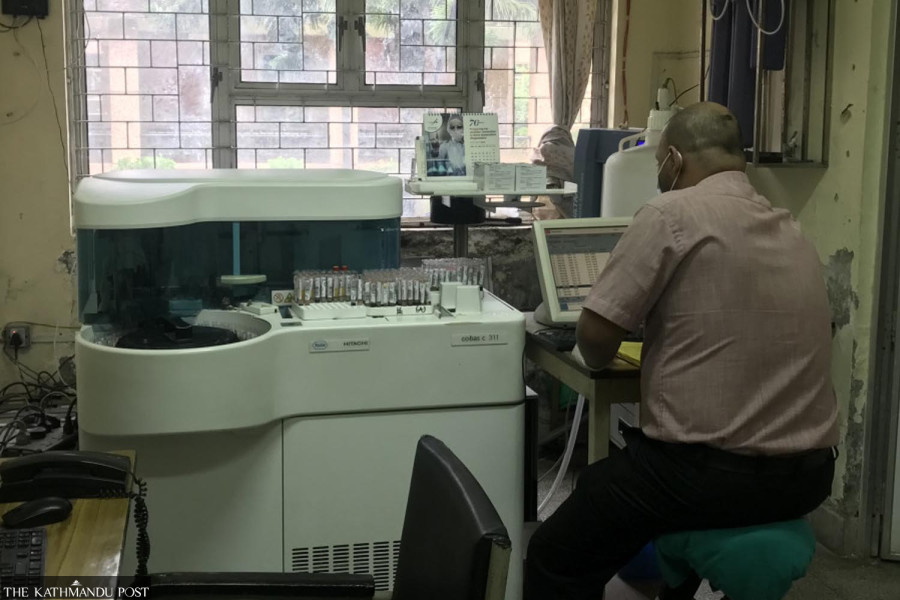Health
Lives at risk as clinical laboratories issue false, often contradictory reports
Most of the clinical labs in Nepal are operating with little regulatory oversight.
Arjun Poudel
A few weeks ago, a 25-year-old woman in labour was rushed to a private hospital in Janakpur in Dhanusha district.
Doctors at the hospital referred the woman to a state-run hospital, as they found that she had suffered a severe blood loss.
Before referring her to the public hospital, a blood type test was done and her group was determined as ‘B positive’.
Blood bank run by the Nepal Red Cross Society had also carried out a test and classified her blood group as ‘B positive’.
“But when B positive blood was transfused on her, she suffered from a reaction,” said Dr Shravan Kumar Mishra, director at the Public Health Laboratory of Madhesh Province. “After the reaction, blood samples were brought to Madhesh Provincial Public Health Laboratory, which carried out back typing and it confirmed the woman’s blood group was, in fact, AB positive.”
This is not the first case of a patient suffering a serious problem due to a wrong lab report. Doctors as well as government officials concede that hundreds of patients might be taking wrong medicines or undergoing needless treatment due to contradicting reports from clinical laboratories.
A few months ago, a five-year-old boy from Kathmandu had a high fever. A doctor who attended to the child asked his parents to come with a routine urine test report. The test was carried out in a laboratory of a nearby pharmacy, which showed a high level of urine glucose—a strong indication of diabetes.
The doctor told the parents that a five-year-old child normally cannot suffer from diabetes and prescribed a repeat urine test in another big lab.
When the parents of the child complained about the report with the pharmacy, he asked them to bring another sample of urine.
But the same lab’s new test report showed urine glucose was normal. The lab’s previous report and the latest one both bore the signatures of a lab technician and a pathologist.
“We have found some people taking blood thinners, some medicines for diabetes, while others stopped taking medications based on wrong reports of laboratories,” said Mishra. “Wrong reports can lead to serious health consequences.”
And what concerns experts is that no agency in the country has been regulating the quality of tests of labs that are mushrooming across the country. Doctors say even if some labs issue ‘normal’ reports without performing any test, there is no agency to monitor such irregularities.
The National Public Health Laboratory, an apex body of clinical laboratories, said that it has been regulating laboratories that fall under A and B categories.
“It is impossible for the central lab to regulate all labs,” said Dr Runa Jha, director at the National Public Health Laboratory. “We have a public health laboratory in each of the seven provinces. Those laboratories should also fulfil their regulatory roles.”
Experts agree that lab reports of private pharmacies are often questionable. They say that the quality of reagents, quality of equipment, and human resources used by private labs affect the accuracy of tests.
“The central lab alone can’t regulate all laboratories,” said Dr Geeta Shakya, former director of the National Public Health Laboratory. “All agencies concerned should play their roles to ensure the results of lab tests are accurate and reliable.”
Mishra said the Provincial Public Health Laboratory of Madhesh has not been able to sufficiently regulate private labs of 'D' and 'E' categories operating in the province, as they come under the jurisdiction of local units. Public health labs in provinces monitor the works of category 'C' laboratories which are few in number, he said.
After the reports of blood grouping tests carried out by the private hospitals and blood bank run by the Red Cross were found to be erroneous, the provincial laboratory sent its technicians to the two health facilities to orient their staff on proper testing.
Officials at the Public Health Laboratory of Madhesh Province said that due to a manpower crunch at local units, they have not been able to monitor and regulate all laboratories operating in their jurisdictions.
“The woman and her newborn child survived and are doing well,” said Mishra. “A possible accident has been averted, but we don’t know how many patients have become victims of wrong reports from such labs.”




 9.72°C Kathmandu
9.72°C Kathmandu















